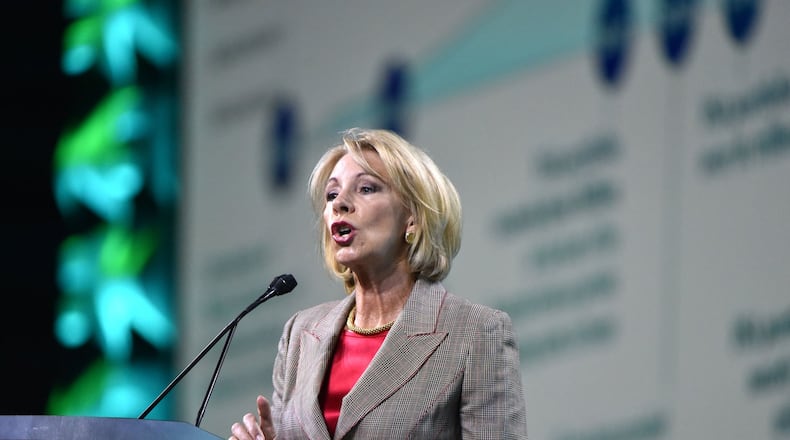Federal education officials unveiled a set of guidelines Wednesday on how the nation’s K-12 schools, colleges and universities should investigate sexual misconduct claims that includes a much-debated provision critics say makes it tougher to punish someone accused of misconduct.
The announcement could have major implications for how claims are investigated in Georgia, particularly on college campuses. There were about 120 reported rapes and acts of dating violence at Georgia’s 20 largest public and private colleges and universities in 2018, according to an Atlanta Journal-Constitution review of annual campus safety reports published online by the schools in October.
Schools can apply a “clear and convincing” evidence standard to determine if someone violated sexual misconduct guidelines instead of a “preponderance of evidence” standard put in place during the Obama administration. The guidelines require one standard or the other. U.S. Education Secretary Betsy DeVos in a conference call with reporters Wednesday described the Obama-era guidelines as “a failed approach.”
“We had kangaroo courts,” DeVos said in reference to how school administrators heard and ruled on cases.
Sexual misconduct complainants and their advocates contend the “clear and convincing standard,” which requires a higher burden of proof, will discourage some accusers from coming forward. Several organizations bashed the announcement, particularly its timing as college administrators grapple with the coronavirus pandemic.
> OPINION: Rolling back Title IX threatens racial and gender justice
“To proceed with a policy change that will require extensive resources for training and implementation while students and schools are already facing unprecedented challenges is positively shameful,” Kim Churches, chief executive officer of the American Association of University Women, said in a statement.
DeVos said her office has been working on the changes for about two years and the guidelines can’t wait.
Other changes include requiring no-contact orders between accusers and the accused during an investigation, holding colleges responsible for off-campus sexual harassment at property owned or under the control of school-sanctioned fraternities and sororities but allowing schools to decide whether to investigate incidents beyond those areas, and allowing student representatives to cross-examine and challenge evidence at a live hearing, which could also keep accusers from reporting assaults, advocates say.
The changes are scheduled to take effect in mid-August.
There's been heightened national awareness of sexual assault and harassment in recent years. The University System of Georgia updated its sexual misconduct policies in 2016 and 2017. USG officials weren't immediately available for comment Wednesday.
Emory University, the state’s largest private university, said in a statement it is reviewing the guidelines. The statement said it has instituted mandatory education and advocacy training for all faculty, staff and students, but noted “Emory recognizes there is more to do, and we will continue our work to make sure all members of our community feel safe, secure and respected.”
Many organizations debated the changes on social media.
The National Women’s Law Center tweeted DeVos “prioritized changing the rules to protect those accused of sexual assault over survivors.”
Some groups had different viewpoints.
Lindsey Burke, director of the Heritage Foundation’s Center for Education Policy, a conservative public policy group, told the AJC that Wednesday’s announcement is a “positive step that better protects all parties.”
About the Author
Keep Reading
The Latest
Featured



